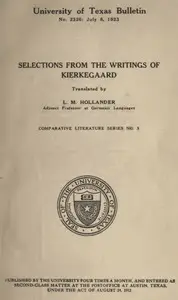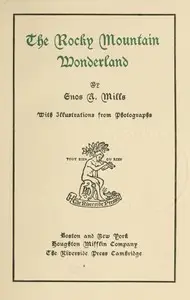"Selections from the Writings of Kierkegaard" by Søren Kierkegaard is a philosophical compendium produced in the early 20th century, synthesizing significant excerpts from the works of the influential Danish thinker. The primary focus of this collection is to present Kierkegaard’s exploration of individual responsibility, faith, and the tension between the aesthetic and ethical life. This anthology seeks to introduce readers to Kierkegaard’s message, emphasizing his unique contributions to existential thought and the importance of self-examination in spiritual life. The opening of the collection sets the stage by providing an overview of Kierkegaard's life and the profound emotional struggles he faced, portraying a man deeply engaged in the quest for meaning amid personal melancholy and societal critique. It details Kierkegaard's upbringing, education, and pivotal experiences that shaped his philosophy, including his complex relationship with love and faith. Through reflections on his engagement with Regine Olson and his observations on the nature of existence, the text beckons readers to consider the intricate layers of human experience, thus inviting them to delve deeper into Kierkegaard's philosophical explorations throughout the rest of the selections. (This is an automatically generated summary.)

Selections from the Writings of Kierkegaard
By Søren Kierkegaard
"Selections from the Writings of Kierkegaard" by Søren Kierkegaard is a philosophical compendium produced in the early 20th century, synthesizing sign...
Søren Aabye Kierkegaard was a Danish theologian, philosopher, poet, social critic, and religious author who is widely considered to be the first Christian existentialist philosopher. He wrote critical texts on organized religion, Christianity, morality, ethics, psychology, and the philosophy of religion, displaying a fondness for metaphor, irony, and parables. Much of his philosophical work deals with the issues of how one lives as a "single individual", giving priority to concrete human reality over abstract thinking and highlighting the importance of personal choice and commitment. He was against literary critics who defined idealist intellectuals and philosophers of his time, and thought that Swedenborg, Hegel, Fichte, Schelling, Schlegel, and Hans Christian Andersen were all "understood" far too quickly by "scholars".













